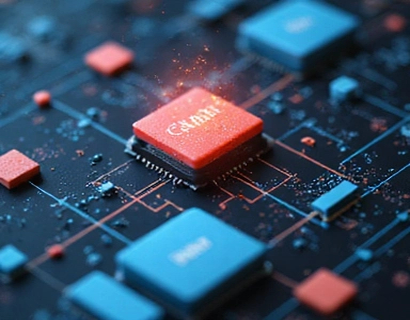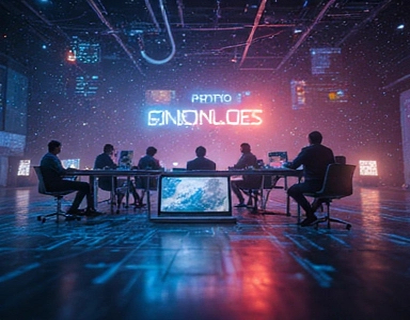Smart Contracts and Management Tools: Revolutionizing Governance for Enhanced Democracy and Participation
In recent years, the intersection of technology and governance has given rise to innovative solutions aimed at transforming traditional democratic processes. Among these, smart contracts and advanced management tools stand out as pivotal elements in creating a more transparent, efficient, and participatory governance system. This article delves into the transformative potential of these technologies, exploring how they can streamline decision-making, enhance transparency, and boost community engagement, ultimately fostering a more universal and participatory democracy.
The Role of Smart Contracts in Governance
Smart contracts are self-executing contracts with the terms of the agreement directly written into code. They run on blockchain technology, a decentralized and immutable ledger that ensures transparency and security. In the context of governance, smart contracts can automate and enforce the execution of agreements and policies, reducing the need for intermediaries and minimizing the potential for human error or manipulation.
One of the most significant advantages of smart contracts in governance is their ability to enforce rules and regulations automatically. For instance, in the realm of public procurement, smart contracts can ensure that all bids are evaluated based on predefined criteria, and the winner is selected and paid automatically once the conditions are met. This not only speeds up the process but also increases accountability and reduces the scope for corruption.
Enhancing Transparency through Blockchain
Transparency is a cornerstone of democratic governance, and blockchain technology, the backbone of smart contracts, plays a crucial role in achieving this. The immutable nature of blockchain ensures that once a transaction or contract is recorded, it cannot be altered or deleted. This transparency extends to all aspects of governance, from financial transactions to policy implementations.
For example, government spending can be tracked in real-time on a blockchain, allowing citizens to see exactly how public funds are being used. This level of transparency builds trust between the government and the governed, as citizens can verify that funds are being used as intended. Similarly, voting processes can be made more transparent by recording votes on a blockchain, ensuring that each vote is counted accurately and cannot be tampered with.
Streamlining Decision-Making Processes
Smart contracts and blockchain technology can significantly streamline decision-making processes in governance. By automating routine tasks and ensuring that decisions are made based on predefined rules, these tools can reduce bureaucracy and increase efficiency.
Consider a local government that needs to approve zoning changes. Traditionally, this process involves multiple stages of review, public comment periods, and votes by city council members. With smart contracts, the criteria for approval can be coded into the contract, and once all conditions are met, the change can be automatically approved and implemented. This not only speeds up the process but also ensures that decisions are made consistently and fairly.
Boosting Community Engagement
One of the most promising aspects of smart contracts and management tools in governance is their potential to boost community engagement. By making governance processes more transparent and accessible, these technologies can encourage more citizens to participate in decision-making.
For instance, a city could use a blockchain-based platform to facilitate public consultations on proposed policies. Citizens can submit their suggestions, vote on different options, and see the results in real-time. This direct involvement in the decision-making process can lead to policies that better reflect the needs and desires of the community, thereby increasing public satisfaction and trust in government.
Moreover, smart contracts can enable decentralized governance models where community members have a direct say in local decisions. For example, a neighborhood could use a smart contract to manage community funds, with residents voting on how to allocate resources for local projects. This decentralized approach not only increases participation but also ensures that resources are used in a way that directly benefits the community.
Challenges and Considerations
While the potential benefits of smart contracts and management tools in governance are significant, there are also challenges and considerations that need to be addressed. One of the primary concerns is the technical complexity and the need for a certain level of digital literacy among citizens and government officials.
To overcome this, education and training programs can be implemented to familiarize stakeholders with the technology. Additionally, user-friendly interfaces and support systems can be developed to make these tools accessible to a broader audience. It is also crucial to ensure that the technology is secure and resilient against cyber threats, as the integrity of governance processes depends on the security of the underlying systems.
Case Studies and Real-World Applications
Several initiatives around the world are already leveraging smart contracts and management tools to enhance governance. One notable example is the city of Zug in Switzerland, often referred to as the "Crypto Valley," which has implemented a blockchain-based identity management system. This system allows residents and businesses to create digital identities that can be used to access various city services, streamlining processes and enhancing security.
Another example is the use of smart contracts in the Netherlands for managing public housing. The government has developed a blockchain-based platform to track and manage the allocation of housing units, ensuring transparency and fairness in the process. This has not only improved efficiency but also increased public trust in the housing allocation system.
The Future of Governance
The integration of smart contracts and management tools in governance represents a significant step towards a more transparent, efficient, and participatory democratic system. As technology continues to evolve, the possibilities for enhancing governance are vast. From voting systems to public service delivery, these tools can play a crucial role in creating a more inclusive and responsive government.
However, the successful implementation of these technologies requires a collaborative effort between technologists, policymakers, and the community. It is essential to involve all stakeholders in the design and deployment of these systems to ensure they meet the needs of the people they serve. By doing so, we can pave the way for a new era of governance that truly embodies the principles of democracy and participation.











































